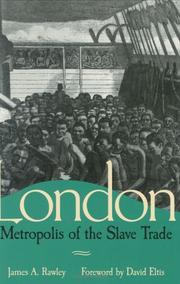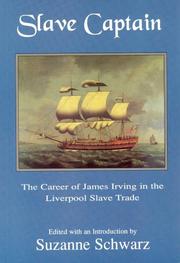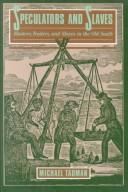| Listing 1 - 10 of 14 | << page >> |
Sort by
|

ISBN: 0826264522 9780826264527 0826214835 9780826214836 Year: 2003 Publisher: Columbia : University of Missouri Press,
Abstract | Keywords | Export | Availability | Bookmark
 Loading...
Loading...Choose an application
- Reference Manager
- EndNote
- RefWorks (Direct export to RefWorks)
Slave trade --- Slave traders --- Slave dealers --- Slavers --- Traders, Slave --- Persons --- History. --- London (England) --- History --- Enslavers
Book
ISBN: 9780299316235 0299316238 9780299316280 0299316289 9780299316204 0299316203 Year: 2018 Publisher: Madison, Wisconsin : The University of Wisconsin Press,
Abstract | Keywords | Export | Availability | Bookmark
 Loading...
Loading...Choose an application
- Reference Manager
- EndNote
- RefWorks (Direct export to RefWorks)
In the early nineteenth century, both Britain and the United States had passed laws prohibiting further transatlantic slaving. Yet the trade covertly carried on. In the summer of 1813, near what is now Liberia, a compound of pens full to bursting with sick and anguished captives was guarded by other African slaves. As a British patrol swooped down on the illicit barracoon, the slavers burned the premises to the ground, hoping to destroy evidence. This story can be told because of an exceptional trove of court documents that provides unparalleled insight into one small link in the great, horrific chain of slavery. Emma Christopher follows a trail of evidence across four continents to examine the lives of this barracoon's owners, their workers, and their tragic human merchandise. She reveals how an American, Charles Mason, escaped justice; while Robert Bostock and John McQueen were taken prisoner and exiled to Australia. Later, when they appealed their arrest in court, British agents collected the testimony of five African men--Tamba, Tom Ball, Yarra, Noah, and Sessay--whose words bear witness on behalf of 233 nameless Africans liberated in the 1813 raid. These men, women, and children, who were relocated to Freetown, Sierra Leone, endured lives of "freedom" much harsher than we would like to imagine. From the fragmented facts of these lives, Christopher also sheds fascinating light on the early development of the nations of Sierra Leone, Liberia, and Australia and the role of former slaves in combatting the illegal trade.
Slaves --- Slave traders --- Slave trade --- Slave dealers --- Slavers --- Traders, Slave --- Persons --- Enslaved persons --- Slavery --- History. --- Enslavers

ISBN: 9781846314070 1846314070 9781781388419 1781388415 1846310679 9781846310676 Year: 2008 Publisher: Liverpool Liverpool University Press
Abstract | Keywords | Export | Availability | Bookmark
 Loading...
Loading...Choose an application
- Reference Manager
- EndNote
- RefWorks (Direct export to RefWorks)
As few accounts written by slave ship captains are known to have survived, the personal papers of James Irving are of tremendous interest and academic significance. Irving built a successful career in the slave trade of eighteenth-century Liverpool, first as a ships surgeon and then as a captain. Remarkably he was himself enslaved when his ship was wrecked off the coast of Morocco and he was captured by people described as wild Arabs and savages. This edition of forty letters and his journal reveals the reaction of the slaver to the experience of slavery, as well as throwing light on the complex and, to modern eyes, repugnant features of the transatlantic slave trade. The result is both a compelling narrative and a valuable reference text. This thoroughly revised edition of Suzanne Schwarzs best-selling book includes recently discovered archive material.
Slave trade --- Slave traders --- Slave dealers --- Slavers --- Traders, Slave --- Persons --- History --- Irving, James, --- Enslavers
Book
ISBN: 0199888515 1282543598 9786612543593 0199704449 9780199704446 9780195376180 0195376188 9780199922833 Year: 2012 Publisher: Oxford Oxford university press
Abstract | Keywords | Export | Availability | Bookmark
 Loading...
Loading...Choose an application
- Reference Manager
- EndNote
- RefWorks (Direct export to RefWorks)
"One of the earliest documents written by an African residing in coastal West Africa predating the arrival of British missionaries and officials in the mid-19th century. Antera Duke was a leader and merchant in late eighteenth-century Old Calabar. His diary is a candid account of daily life in an African community during a period of great historical interest"--Provided by publisher.
Slave traders --- Slave trade --- Slave dealers --- Slavers --- Traders, Slave --- Persons --- History --- Duke, Antera --- Old Calabar (Nigeria) --- Calabar (Nigeria) --- Enslavers
Book
ISBN: 2070734994 9782070734993 Year: 2004 Volume: *31 Publisher: Paris Gallimard
Abstract | Keywords | Export | Availability | Bookmark
 Loading...
Loading...Choose an application
- Reference Manager
- EndNote
- RefWorks (Direct export to RefWorks)
Esclaves [Marchands d'] --- Handelaars [Slaven] --- Marchands d'esclaves --- Négriers --- Slave dealers --- Slave traders --- Slaven--Handelaars --- Slavenhandelaars --- Slavers --- Traders [Slave ] --- Slave trade --- Esclaves --- History --- Commerce --- Histoire --- Slave-trade --- Slavery --- Africa --- Slave-trade - History --- Slavery - History --- NOIRS --- TRAITE DES ESCLAVES --- ESCLAVAGE --- HISTOIRE

ISBN: 2070530183 9782070530182 Year: 1986 Volume: 11 Publisher: Paris Gallimard
Abstract | Keywords | Export | Availability | Bookmark
 Loading...
Loading...Choose an application
- Reference Manager
- EndNote
- RefWorks (Direct export to RefWorks)
Esclaves [Marchands d'] --- Handelaars [Slaven] --- Marchands d'esclaves --- Négriers --- Slave dealers --- Slave traders --- Slaven--Handelaars --- Slavenhandelaars --- Slavers --- Traders [Slave ] --- Slavery --- America --- History --- Esclavage --- Traite des esclaves --- Slave trade --- Histoire. --- History.
Book
ISBN: 0300213891 9780300213898 9780300192001 0300192002 Year: 2015 Publisher: New Haven, CT
Abstract | Keywords | Export | Availability | Bookmark
 Loading...
Loading...Choose an application
- Reference Manager
- EndNote
- RefWorks (Direct export to RefWorks)
Calvin Schermerhorn's provocative study views the development of modern American capitalism through the window of the nineteenth-century interstate slave trade. This eye-opening history follows money and ships as well as enslaved human beings to demonstrate how slavery was a national business supported by far-flung monetary and credit systems reaching across the Atlantic Ocean. The author details the anatomy of slave supply chains and the chains of credit and commodities that intersected with them in virtually every corner of the pre-Civil War United States, and explores how an institution that destroyed lives and families contributed greatly to the growth of the expanding republic's capitalist economy.
Slave trade --- Slave traders --- Slaves --- Slavery --- Capitalism --- Market economy --- Economics --- Profit --- Capital --- Enslaved persons --- Persons --- Slave dealers --- Slavers --- Traders, Slave --- History --- Social conditions --- Economic aspects --- E-books --- United States --- 19th century --- Enslavers
Book
ISBN: 0821444956 9780821444955 9780821421062 0821421069 9780821421079 0821421077 Year: 2014 Publisher: Athens, Ohio
Abstract | Keywords | Export | Availability | Bookmark
 Loading...
Loading...Choose an application
- Reference Manager
- EndNote
- RefWorks (Direct export to RefWorks)
Between 1500 and 1850, European traders shipped hundreds of thousands of African, Indian, Malagasy, and Southeast Asian slaves to ports throughout the Indian Ocean world. The activities of the British, Dutch, French, and Portuguese traders who operated in the Indian Ocean demonstrate that European slave trading was not confined largely to the Atlantic but must now be viewed as a truly global phenomenon. European slave trading and abolitionism in the Indian Ocean also led to the development of an increasingly integrated movement of slave, convict, and indentured labor during the late eighteent
Slave trade --- Slave traders --- Slave dealers --- Slavers --- Traders, Slave --- Persons --- History. --- POLITICAL SCIENCE --- SOCIAL SCIENCE --- Slave trade. --- Slave traders. --- Public Policy --- Cultural Policy. --- Anthropology --- Cultural. --- Popular Culture. --- History --- Europe. --- Indian Ocean Region. --- Enslavers
Book
ISBN: 1625344015 1613766521 162534404X Year: 2019 Publisher: Amherst ; Boston : Bright Leaf,
Abstract | Keywords | Export | Availability | Bookmark
 Loading...
Loading...Choose an application
- Reference Manager
- EndNote
- RefWorks (Direct export to RefWorks)
"Edward Davoll was a respected New Bedford whaling captain in an industry at its peak in the 1850s. But mid-career, disillusioned with whaling, desperately lonely at sea, and experiencing financial problems, he turned to the slave trade, with disastrous results. Why would a man of good reputation, in a city known for its racial tolerance and Quaker-inspired abolitionism, risk engagement with this morally repugnant industry? In this riveting biography, Anthony J. Connors explores this question by detailing not only the troubled, adventurous life of this man but also the turbulent times in which he lived. Set in an era of social and political fragmentation and impending civil war, when changes in maritime law and the economics of whaling emboldened slaving agents to target captains and their vessels for the illicit trade, Davoll's story reveals the deadly combination of greed and racial antipathy that encouraged otherwise principled Americans to participate in the African slave trade"--
Slave traders --- Whaling masters --- Slave trade --- Whaling --- Seafaring life --- Sailors' life --- Sea life --- Adventure and adventurers --- Manners and customs --- Voyages and travels --- Commercial whaling --- Hunting, Whale --- Whale fisheries --- Whale hunting --- Fisheries --- Masters, Whaling --- Whaling captains --- Whalingmasters --- Ship captains --- Whalers (Persons) --- Slave dealers --- Slavers --- Traders, Slave --- Persons --- Moral and ethical aspects --- History --- Davoll, Edward S. --- Ethics. --- New Bedford (Mass.) --- Enslavers

ISBN: 0299118509 Year: 1989 Publisher: Madison (Wis.): University of Wisconsin
Abstract | Keywords | Export | Availability | Bookmark
 Loading...
Loading...Choose an application
- Reference Manager
- EndNote
- RefWorks (Direct export to RefWorks)
326 <73> --- 973.05 --- Slavernij--(algemeen)--Verenigde Staten van Amerika. VSA. USA --- Geschiedenis van de Verenigde Staten van Amerika: vroege 19e eeuw--(1809-1845) --- 973.05 Geschiedenis van de Verenigde Staten van Amerika: vroege 19e eeuw--(1809-1845) --- 326 <73> Slavernij--(algemeen)--Verenigde Staten van Amerika. VSA. USA --- Slaveholders --- Slaves --- Slave traders --- Slave-trade --- Slave dealers --- Slavers --- Traders, Slave --- Persons --- Slave holders --- Slave masters --- Slave owners --- Slavemasters --- Slaveowners --- Plantation owners --- Slavery --- History --- Social conditions --- Southern States --- Slave trade --- United States --- 19th century --- 1775-1865 --- Slave narratives --- Enslavers
| Listing 1 - 10 of 14 | << page >> |
Sort by
|

 Search
Search Feedback
Feedback About UniCat
About UniCat  Help
Help News
News